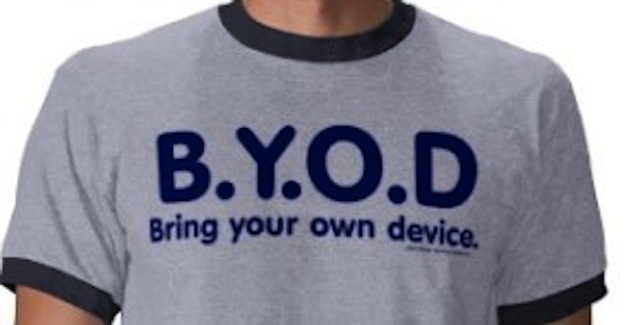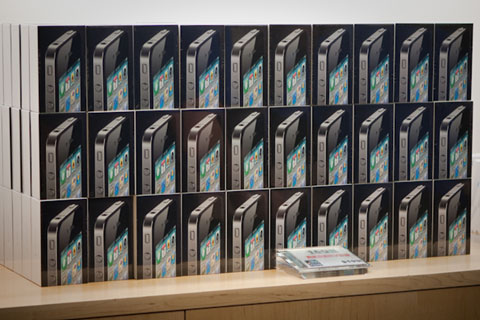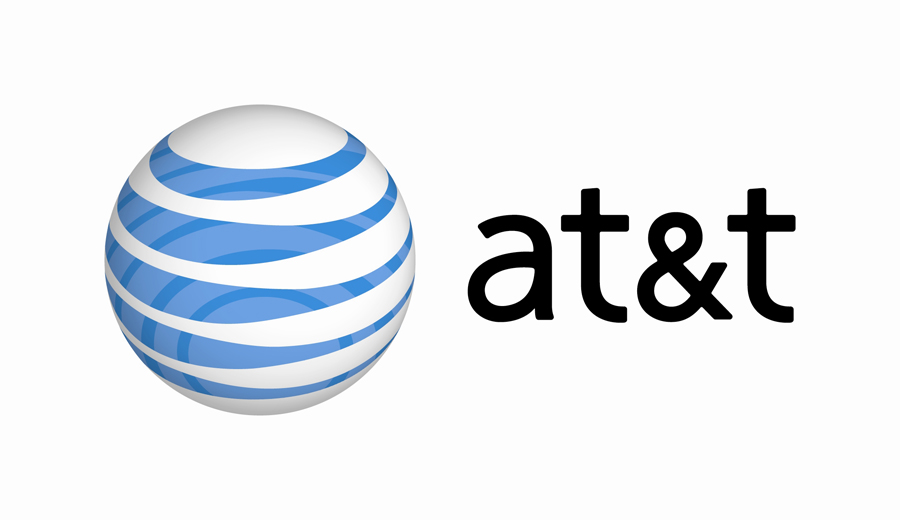|
|
In this edition of Views and News, we examine the new approach to marketing wireless services being introduced by several wireless resellers -- "Bring Your Own Device" (BYOD) -- and show how "unbundling" the purchase of wireless handsets from the purchase of wireless serivces offers the potential for significant cost savings, both for individual consumers and for large corporate/government organizations. We also break down AT&T's recent ballyhoo about a massive new capital expenditure program which, when examined a bit more closely, actually turns out to represent little more than a small incremental change in AT&T's ongoing level of capital investment.
Read on below, or navigate over to
econtech.com
where you can read online, or download a
printer-friendly version.
|
|
An emerging new business model for wireless service – "Bring Your Own Device"
|
|
 Back in the 1980s when cellular was in its infancy, when cell phone weights were stated in pounds rather than ounces and when most came with automobiles attached to them, the full retail price of these early handsets ran upwards of $1,000; even more for what passed for "portable" units that needed to be hauled around in a small suitcase.
Back in the 1980s when cellular was in its infancy, when cell phone weights were stated in pounds rather than ounces and when most came with automobiles attached to them, the full retail price of these early handsets ran upwards of $1,000; even more for what passed for "portable" units that needed to be hauled around in a small suitcase.
To make matters worse, just a few years earlier in its so-called Computer Inquiry II ruling, the FCC prohibited carriers from bundling customer premises equipment (CPE) with telephone service, so that the only means by which the carriers could place cellphones in the hands of potential customers was to "sell" the phones to them. But as the newly minted wireless carriers quickly discovered, at $1,000 to $2,000 a pop, the price of a cellphone presented a formidable – seemingly insurmountable – barrier to widespread consumer acceptance of this new technology. The carriers' solution was to offer these expensive devices for sale to their customers at prices that were set well below the carriers' costs. The cost of these "handset subsidies" would then be recovered by setting monthly cellular access and per-minute airtime usage rates well in excess of the carriers' costs for fulfilling these functions.
The major wireless carriers maintain their platform pricing and subsidized handset pricing strategies because they are highly profitable, not necessarily because the subsidies are still needed to attract customers. Will the larger carriers be pressured by competitors like Ting, Cricket and Virgin to offer unbundled BYOD pricing?
Continue reading at econtech.com
|
|
BYOD creates an exciting new approach for enterprise customers to negotiate bulk purchases of wireless service
|
|
 The movement away from wireless pricing in which handsets and services are bundled to unbundled, service-only, "bring your own handset" pricing brings with it exciting new opportunities for larger business/government/institutional customers to revise their strategies for negotiating large volume purchases of wireless service. As it stands today, even the largest businesses typically purchase wireless service in much the same way that individual consumers do, where each phone has its own plan, contract, and bucket of minutes, text messages, and data. Despite the fact that a major corporate or government customer might be using tens or hundreds of thousands of wireless devices, their wireless services are often managed and maintained as individual or relatively small departmental accounts. This arrangement means that such large organizations have effectively dissipated much of their potential market clout, and thus are not in a position to engage in substantive negotiations to secure favorable wholesale-level pricing directly from handset manufacturers or wireless carriers for discounted bulk minutes or data. These institutional buyers often even suffer the indignity of paying one-off early termination fees on individual handsets if they close the account of a departing employee.
The movement away from wireless pricing in which handsets and services are bundled to unbundled, service-only, "bring your own handset" pricing brings with it exciting new opportunities for larger business/government/institutional customers to revise their strategies for negotiating large volume purchases of wireless service. As it stands today, even the largest businesses typically purchase wireless service in much the same way that individual consumers do, where each phone has its own plan, contract, and bucket of minutes, text messages, and data. Despite the fact that a major corporate or government customer might be using tens or hundreds of thousands of wireless devices, their wireless services are often managed and maintained as individual or relatively small departmental accounts. This arrangement means that such large organizations have effectively dissipated much of their potential market clout, and thus are not in a position to engage in substantive negotiations to secure favorable wholesale-level pricing directly from handset manufacturers or wireless carriers for discounted bulk minutes or data. These institutional buyers often even suffer the indignity of paying one-off early termination fees on individual handsets if they close the account of a departing employee.
Until recently, large businesses had little choice – these single accounts were their only option. Now, the concept of BYOD – bring your own device – (although typically used to describe an individual consumer bringing her own device, see accompanying article) presents an opportunity to revolutionize the way enterprise and government entities negotiate and purchase wireless service. Instead of buying numerous individual plans, these customers would negotiate directly with Samsung, Apple, and Motorola for handsets, and then negotiate with wireless carriers just for service. Much like an MVNO that contracts to buy and resell bulk service from a carrier, large enterprise customers can similarly formulate purchasing models whereby they purchase minutes and megabytes by the millions to be used by all employees, without the hassle–and markups–of individual accounts – much as these same companies have been doing for years when purchasing wireline telecommunications services.
Continue reading at econtech.com
|
|
AT&T announces "$14-billion" capital investment plan
|
|
 As part of its third quarter earnings reporting, AT&T has announced that it will invest $14-billion over the next three years "to significantly expand and enhance its wireless and wireline IP broadband networks to support growing customer demand for high-speed Internet access and new mobile, app and cloud services." Randall Stephenson, AT&T chairman and chief executive officer, commented that "[t]his is a major commitment to invest in 21st Century communications infrastructure for the United States and bring high-speed Internet connectivity – 4G LTE mobile and wireline IP broadband – to millions more Americans."
As part of its third quarter earnings reporting, AT&T has announced that it will invest $14-billion over the next three years "to significantly expand and enhance its wireless and wireline IP broadband networks to support growing customer demand for high-speed Internet access and new mobile, app and cloud services." Randall Stephenson, AT&T chairman and chief executive officer, commented that "[t]his is a major commitment to invest in 21st Century communications infrastructure for the United States and bring high-speed Internet connectivity – 4G LTE mobile and wireline IP broadband – to millions more Americans."
Many news outlets, including the New York Times, portrayed this announcement as if AT&T had committed to spending an additional $14-billion above and beyond existing planned capital expenditures. This is exactly the mis-impression AT&T must have been hoping to create. On the very same day, the company filed a petition with the Federal Communications Commission concerning AT&T's transition from TDM to IP network technology. Specifically, AT&T would like the FCC to eliminate what remains of telecommunications regulation. AT&T's concurrent $14-billion announcement was no coincidence – it is a regulatory carrot and stick.
Continue reading at econtech.com
|
|
|
|
About ETI. Founded in 1972, Economics and Technology, Inc. is a leading research and consulting firm specializing in telecommunications regulation and policy, litigation support, taxation, service procurement, and negotiation. ETI serves a wide range of telecom industry stakeholders in the US and abroad, including telecommunications carriers, attorneys and their clients, consumer advocates, state and local governments, regulatory agencies, and large corporate, institutional and government purchasers of telecom services. |
|
|